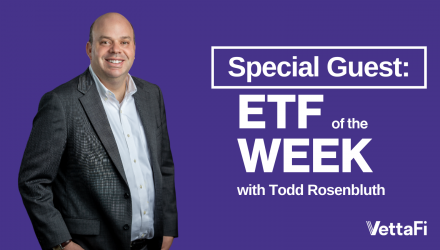VettaFi’s head of research Todd Rosenbluth discussed fixed income and international equity on this bonus “ETF of the Week” podcast with Chuck Jaffe of “Money Life.”
Rosenbluth told Jaffe that VettaFi has been seeing some “really strong interest in international equities,” with international equities bringing in nearly $30 billion in inflows at the start of the year while U.S. equity ETFs saw about $6 billion in outflows during the same period. So, VettaFi asked the investment community what they thought about developed international markets and what’ll happen over the next year.
International Investing: A Better Alternative
During a March webcast hosted by VettaFi, advisor attendees were asked how they believed developed international markets would perform relative to the U.S. going forward. Most respondents (54%) said they believed international equity ETFs would outperform the U.S. in the year ahead, while roughly a quarter said they expect a similar level of performance for both markets. Only 21% said they believe the U.S. will outperform international markets.
“International investing just seems like a better alternative for many investors,” Rosenbluth said.
And with that information the financial advisors provided, VettaFi went to find some investment ideas. The largest of these is the Vanguard FTSE Developed Markets ETF (VEA), which is slightly larger than the iShares Core MSCI EAFE (IEFA).
“The reason I think investors should be paying more attention to VEA is that It’s more broadly diversified,” Rosenbluth said. “VEA… has exposure to Canada that you wouldn’t find within an EAFE-based market. So, VEA is a good way of getting exposure to [international equities].”
And while most international equity ETFs tend to be more indexed-based, Rosenbluth also wanted to highlight an actively managed ETF. So, the Harbor International Compounders ETF (OSEA) is an actively managed option with just under 40 stocks of faster-growing, high-quality companies that Rosenbluth thinks “people who believe in active management should certainly take a closer look at.”
Rosenbluth explained that investors are getting more comfortable with active management in the ETF wrapper.
“We’ve seen growing adoption of actively managed ETFs,” he said. They’re roughly 5% of the overall ETF marketplace. Last year they were about 15% of the overall ETF flows. As of February, they were closer to 40%.”
Growing Interest in (Short-Term) Fixed Income
Another area that VettaFi is focusing on is fixed income, an asset class investors are increasingly turning to this year — particularly the shorter-duration products.
“We’ve seen investor interest in the relatively safe fixed income products,” Rosenbluth said, citing short-term Treasury ETFs that protect against downside risk like the Vanguard Short-Term Treasury ETF (VGSH) and the SPDR Bloomberg 1-3 Month T-Bill ETF (BIL) that have been popular.
Rosenbluth also noted that while we may see the Federal Reserve pause its rate hikes earlier, there are still a lot of concerns about high yield or longer-term treasuries.
“I think there’s just too much risk in going out through duration,” he said. “We’re likely to see more volatility in the fixed income marketplace, and I think investors would be better suited earning the 4% they can through short-term treasury ETFs instead of taking on that interest rate risk.”
Four Bulls and a Bear
Later in the interview, Rosenbluth offered his thoughts on some ETFs that listeners requested more information about. The first of these ETFs was the Invesco S&P 500 Equal Weight ETF (RSP), in which Rosenbluth shared his “bullish” thoughts on this “good opportunity.”
“I would be bullish on this ETF because we are seeing individual, specific stock issues creep up, and you get the benefits of diversification,” Rosenbluth said. “So, better than having heavyweights within your portfolio, RSP is an alternative to getting the S&P 500 in a more diversified way.”
Listeners also wanted to know about the Horizon Kinetics Inflation Beneficiaries ETF (INFL), an actively managed ETF that invests in companies that can benefit from persistent inflation. While we saw CPI and PPI numbers come down a bit, “inflation is still here for a while,” according to Rosenbluth.
“I think exposure to… companies in the energy and materials space can serve a great value, so INFL is a good ETF,” he added.
Regarding the Alerian MLP ETF (AMLP), Rosenbluth said, “this is a good suite spot in the energy marketplace.”
“These are higher quality energy infrastructure companies that have to pay dividends,” he said. “It’s a higher quality way of getting energy exposure. AMLP is a good ETF.”
Rosenbluth was also bullish on the Vanguard Tax-Exempt Bond ETF (VTEB), which he thinks would be a good “bonus position” to some of the fixed income ETFs he recommended earlier in the episode.
“VTEB is a very low-cost ETF, well diversified and very liquid,” he said. “It’s a great way to get exposure to the municipal bond marketplace, which is holding up quite well.”
And after being four for four in terms of buy recommendations, that changed with the fifth and final ETF Rosenbluth was asked about: the SPDR Portfolio High Yield Bond ETF (SPHY). While it has the advantage of being cheap, investors shouldn’t be too comfortable taking on too much credit risk.
“In this environment, I think investors are looking for the relative safety of investment grade corporate bonds and treasuries and are less comfortable taking on that credit risk,” he said before adding: “I think there’s just better ways to get income exposure.”
Listen to the Bonus Episode Here:
For more news, information, and analysis, visit VettaFi | ETF Trends.
vettafi.com is owned by VettaFi LLC (“VettaFi”). VettaFi is the index provider for AMLP, for which it receives an index licensing fee. However, AMLP is not issued, sponsored, endorsed, or sold by VettaFi, and VettaFi has no obligation or liability in connection with the issuance, administration, marketing, or trading of AMLP.

